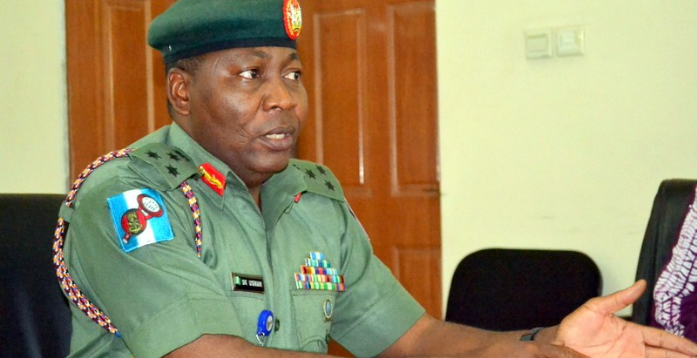‘Soldiers Fired Blank Bullets At Lekki Protesters’ – Ex-Army Spokesman

Soldiers fired blank bullets at the Lekki protest ground, and not live ammunition as widely claimed, Sani Usman, a former spokesman of the Nigerian Army, said.
The retired brigadier general said this during an Arise Television programme on Thursday.
He said that contrary to reports that many were killed in the incident, the blank ammunition used is not capable of killing anyone.
HumAngle had earlier reported how men in military uniform opened fire at the Lekki tollgate in Lagos where a group of peaceful protesters were reportedly killed on October 20.
Forensic analysis of videos showing the killing of protesters at the Lekki toll-gate area by soldiers on Tuesday has shown them to be authentic, in spite of the Nigerian Army’s classification of the reports as fake and the Defence Headquarters’ claim that the videos were doctored.
In a report published by the Digital Forensic Research (DRF) Lab and made available to HumAngle, it noted that open-source evidence contradicted these denials.
“Several videos corroborate the location and presence of Nigerian soldiers at the Lekki Toll Plaza, a major toll highway toll concession in the south of Lagos,” said Jean Le Roux, the lab’s Research Associate for Southern Africa.
“Video footage posted on Twitter place Nigerian soldiers at the plaza, where they are seen approaching peaceful demonstrators and opening fire. Subsequent footage shows injured civilians being carried away from the same location.”
Using four videos, the DFRLab geolocated the shooting at the toll-gate “despite denials by the Nigerian military”.
Although the Nigerian Army initially denied reports of being involved in the incident, it later admitted that its men were invited to restore order.
When he was interviewed on Thursday, Usman said there was enough ground to involve the military in the protests, citing reports of violence in parts of the state as a justification.
He accused various persons and organisations – including Amnesty International – which had fingered the army in the reported killings – of politicising the issue and lying against the military.
“People have decided to denigrate the military and to turn the military as the fall guy but evidence on ground does not support that assertion,” said Usman who retired from active service in 2019.
“Yes, there was the deployment of the military; to what extent and all that, it will be determined by the commission of enquiry.
“If you look at the canisters, they were blank ammo and blank ammo don’t even kill. At a close range, maybe 100-metres, it will have some pigmentation on your skin. Let’s leave the commission of enquiry to do its job.
“But it is very dangerous for anybody to politicise security in this country. The military is a symbol of national unity and national power; they should be insulated from all these politics.”
He added that the military should be commended for avoiding “serious collateral damage” during the shooting.
“Remember the military are armed and by the nature of their training, they are trained to kill and I think the military in its wisdom instead of using live ammunition decided to use blank armour which is meant for training,” Usman said.
“I think they should be commended for that otherwise there would have been serious collateral damage, but they were professional enough to have done that.”
Meanwhile, on Wednesday, Amnesty International called on Nigerian authorities to stop attempts to cover up the Lekki Toll Gate massacre.
In an earlier Amnesty International report on October 21, at least 12 persons were reported to have been killed at Alausa and Lekki.
Both locations are in Lagos and At least 56 people have died across the country since protests began.
The Global Human Rights organisation made the call, as it released a timeline investigating the atrocity, on Tuesday, October 20.
Support Our Journalism
There are millions of ordinary people affected by conflict in Africa whose stories are missing in the mainstream media. HumAngle is determined to tell those challenging and under-reported stories, hoping that the people impacted by these conflicts will find the safety and security they deserve.
To ensure that we continue to provide public service coverage, we have a small favour to ask you. We want you to be part of our journalistic endeavour by contributing a token to us.
Your donation will further promote a robust, free, and independent media.
Donate HereStay Closer To The Stories That Matter




